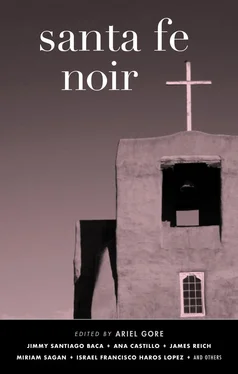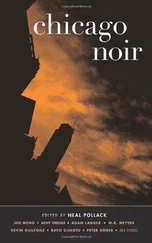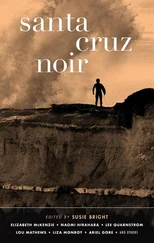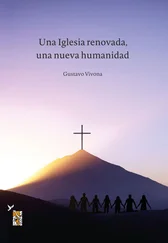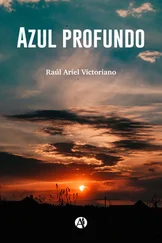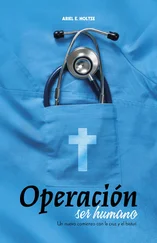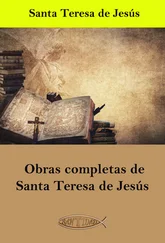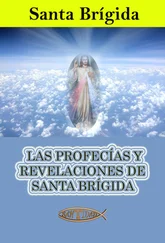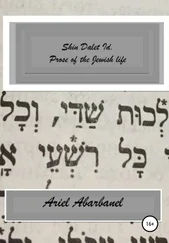Ariel Gore - Santa Fe Noir
Здесь есть возможность читать онлайн «Ariel Gore - Santa Fe Noir» весь текст электронной книги совершенно бесплатно (целиком полную версию без сокращений). В некоторых случаях можно слушать аудио, скачать через торрент в формате fb2 и присутствует краткое содержание. Город: New York, Год выпуска: 2020, ISBN: 2020, Издательство: Akashic Books, Жанр: Детектив, на английском языке. Описание произведения, (предисловие) а так же отзывы посетителей доступны на портале библиотеки ЛибКат.
- Название:Santa Fe Noir
- Автор:
- Издательство:Akashic Books
- Жанр:
- Год:2020
- Город:New York
- ISBN:978-1-61775-722-8
- Рейтинг книги:3 / 5. Голосов: 1
-
Избранное:Добавить в избранное
- Отзывы:
-
Ваша оценка:
- 60
- 1
- 2
- 3
- 4
- 5
Santa Fe Noir: краткое содержание, описание и аннотация
Предлагаем к чтению аннотацию, описание, краткое содержание или предисловие (зависит от того, что написал сам автор книги «Santa Fe Noir»). Если вы не нашли необходимую информацию о книге — напишите в комментариях, мы постараемся отыскать её.
Santa Fe Noir — читать онлайн бесплатно полную книгу (весь текст) целиком
Ниже представлен текст книги, разбитый по страницам. Система сохранения места последней прочитанной страницы, позволяет с удобством читать онлайн бесплатно книгу «Santa Fe Noir», без необходимости каждый раз заново искать на чём Вы остановились. Поставьте закладку, и сможете в любой момент перейти на страницу, на которой закончили чтение.
Интервал:
Закладка:
Like Say Dog? I had said, and she’d nodded that this was close enough. I don’t know how many years ago I met Tséh Dog. She recognized me at Hotel La Fonda one night, the place that sits like a ziggurat upon the crushed labyrinth of the old hotel, The Exchange, where I washed dishes. I heard her call my name. “Billy,” she said, noting my shade crossing the bar, and I was brought up like a man called out on the street. My ghost is like shattered glass — some in Mesilla — Silver City — Fort Sumner — and she had one of me to scry with. She calls me Coyote, Fox-Boy, Rabbit, other things. Tséh Dog may be the future, earthbound, resistant to astronauts, protector of emptiness. “There’s a chopper coming.” She reaches into the leg pocket of the first corpse’s flight suit.
If the others had subcutaneous trackers, we wouldn’t have lost them. Yet, did it give the third a false sense of security, as if the Agency was a god to watch over him? Martin Richter studied his screen, the blue blip movement without biosignal. They were close, but both things could not be true, he thought. Perhaps the chip was damaged, reporting movement randomly, without cause, while the astronaut lay sleeping at the hotel; or perhaps he was moving, playing the tourist oblivious to the fact that his life signs were flat. Now, Richter felt a thin flush of embarrassment — better to have instructed the pilot to take him to the hotel first, to rule out catastrophe before assuming it? Now they were low over the pines, skimming the flanks of the Sangre de Cristos, closing in on a sparking microdot, their searchlight probing out ahead and below them, vicious white against the darkness. Taking the rifle from its rack, he opens the side door to a gale of freezing air, and the deafening beat of the rotors. “There!” The spotlight falls on the dead astronauts, a glitter-ball light blooming from the silver helmet of the third. The men seem to have spilled from space. The pilot’s voice squelches over the comm-link, and the Huey jolts like a startled horse, as his shock translates through the stick. Richter fires at the figure standing over the bodies. He hears the bullet ricochet from the rock. Struggling to aim again, he calls to the pilot, “Gas, now!” He sees her clearly for a moment. The hunting rifle feels good in his shoulder, riddled with cool rage. The pilot hovers the chopper over the scene. Like shooting the wolf that took your lamb , Richter tells himself. He fires again, and pulls on a mask as the spectral plume drifts below, but is taken by the wind, away from the grove with its terrible shrine. “Keep us still... Keep us—”
Tséh Dog curls her shoulder under another shot from the helicopter, like a boxer turning under a punch, raising the pistol she took from the flight-suited dead like an uppercut, fluid and fierce. She fires off-center from the spotlight, second-guessing the pilot. The second shot paints the cockpit with his larynx and milky studs of jawbone and tooth that drip down the curved glass. The chopper pitches and howls in the moonlight, the beam of the searchlight swiping over the deep trees, moving away, before it enters a terminal tilt and dives forward, as if into unconsciousness. The rotors are ripped from the fuselage and the tail breaks like a wishbone in the shredding boughs. Birds lift into the night. There are no flames. Soon there is silence. And we ride back to La Fonda.
The astronaut’s possessions are in our room, like relics of the future. Tséh Dog doesn’t think the Agency will send anyone here, not with one of their choppers lost up in the Sangres. Somehow, they knew we had taken him there. They will discover their crashed helicopter. Certainly, then, they will discover their dead astronauts arranged in the grove. The terror of it will hold them at bay for a time. The story will not get out, unless Tséh Dog tells it. We sleep like the dead, awaken shimmering with rude promise. “We should go down there,” she says, “to the spaceport.” I look at her funny. “Go to Mars in their place,” she suggests. I’m not certain that she is kidding me. For the present, we ride the elevator down to get breakfast in the old Placita, now La Plazuela, the hotel dining room with its fountain. Her chromium reflection suggests that she is thinking about the third astronaut. How she killed him, I don’t know. “Come on, Coyote. I’m hungry.” The future is visible, like a movie, readable for those with eyes to see it.
After breakfast we walk the plaza; now the yellow police tape and forensics crew are gone. The sun is bright over the mountains. The air is crystalline, sharp with altitude. Tséh Dog has a hip flask of mezcal, and the taco carts are out. Gradually, slow in the glamour of our time, we turn the quadrants onto Indian row, where the vendors are out, cramped on their blankets and folding stools, with their silver, clay, and turquoise on black sheets before them. A sunburned child with a plastic raygun shoots sparks at the Indians from across the street. Tséh Dog combs her pompadour and gets five dollars from the parents for posing as a villain. Afterward, she curls her lip in disgust, but she does have the mother’s wristwatch. It can be sold in a few days. The day goes like that. Later, we watch a Native kid skateboarding on the bandstand. The kid rumbles and scrapes in radical circles, and there are tears in Tséh Dog’s eyes. She’s happy. She has the bonfire taste of the mezcal in her mouth, and she’s thinking about the ritual in the mountains. I can feel it. The pines redden at the close of day.
At La Fonda, there’s a Western swing band playing in the arcade bar, and the tourists are dancing like rhinestone cowboys and their booted cowgirls, so we take the elevator to the Bell Tower, to drink in the open air over the streets. It’s quiet and the evening is glassy with stars. Lifting her martini, she points out the constellations as they emerge — Bear, Spider God, Elk Skin, Coyote, Two Dogs. Tséh Dog speaks: “ Why do we do this? James Dean asks Bud before the chickie run in stolen cars toward the bluffs. Why do we do this? the boy asks his father under the spokes of the sundance tree where the hooks hang. Why do we do this? Jesus asks his father from the bloodstained cross. You’ve gotta do something , Bud says, and is crucified in his car. So say the fathers, but that’s not it. Marlon Brando says, What’ve you got? Is it our fate to dash ourselves against the sky, to interrupt the stars with craziness?” I don’t know what to say to her. By now she is soft and melancholy with the alcohol. She is out on some bough of self, and it bends under her weight. There is her gravity. There is the earth’s gravity. There is Mars, and dead astronauts. She is on the rim of a red crater in being. Finally she says, “Fuck it. Let’s go down and dance with the cowboys.”
Unknown, I pass through the thick bodies as they two-step. They think it’s the warp of their drinks working on them. No, that shiver is a ghost through your flesh, insisting, Yes, yes, I’m here . A guitar string twangs. The hi-hat ticks. The air is heavy with perfume, as if it runs from the faucets of the rooms. These people make me nervous, and soon I’m waiting at the edge, beneath the surface. Alone, Tséh Dog grooves and ruts between them, and a little space forms. But they can’t get far from her. No one gets far, that’s what I’ve learned since 1881. That’s what it is to haunt and be haunted. A shadow is never merely a shadow, you can ask Pat Garrett. When the band takes a break, I sit beside Tséh Dog at the bar. She is panting. Sipping from her martini, she pulls out one of the relics of the third astronaut. Her smile is crooked. “I think this is the hotel,” Tséh Dog says, brandishing a ratty paperback, “from this book.”
Читать дальшеИнтервал:
Закладка:
Похожие книги на «Santa Fe Noir»
Представляем Вашему вниманию похожие книги на «Santa Fe Noir» списком для выбора. Мы отобрали схожую по названию и смыслу литературу в надежде предоставить читателям больше вариантов отыскать новые, интересные, ещё непрочитанные произведения.
Обсуждение, отзывы о книге «Santa Fe Noir» и просто собственные мнения читателей. Оставьте ваши комментарии, напишите, что Вы думаете о произведении, его смысле или главных героях. Укажите что конкретно понравилось, а что нет, и почему Вы так считаете.
